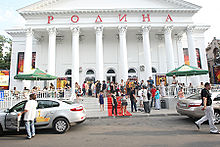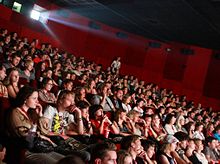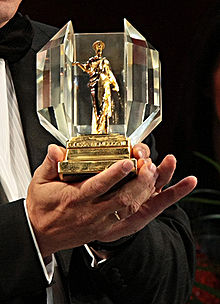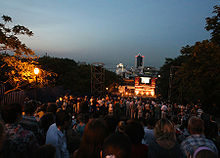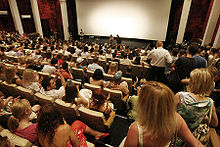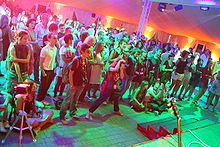- Odessa International Film Festival
-
Odessa International Film Festival 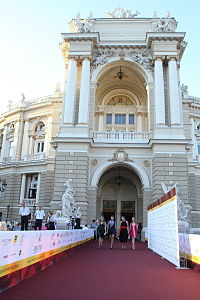
Location Odessa, Ukraine Founded 2010 Awards Grand Prix "The Golden Duke" Festival date second half of July Language Ukrainian, Russian, English Official website The Odessa International Film Festival (Ukrainian: Одéський міжнарóдний кінофестивáль) is an annual film festival held in the middle of the July in Odessa, Ukraine. It was held for the first time July 16th – 24th, 2010[1].
The festival is young. However, the organizers set before themselves a rather ambitious goal: to develop it into one of the leading film forums in Eastern Europe – The Cannes of Eastern Europe[2].
Contents
History
The first Odessa International Film Festival was held from the 16th to the 24th of July, 2010. It offered to its audiences a competition program of 16 films and over 50 films out of competition. The “Rodina” theater served as the main venue for the festival as well as the festival center. It screened all films in the competition program as well as hosting special festival events. Other screening took place all around Odessa in many city theaters. One of the most outstanding architectural monuments in all of Ukraine, the Odessa Opera and Ballet Theater, served as the venue for the opening and closing festival ceremonies[3].
The first festival was attended by over 40 thousand audience members. In the following year, this number increased almost by a factor of 2 – over 70 thousand viewers attended and over 5 thousand guests graced the festival with their presence[4]. Over 450 journalists from Ukraine, Russia, Germany, USA, Romania, Italy and other countries received festival accreditation.
The festival also includes a dynamic special project entitled Summer Film School[5]): a series of master-classes, taught by noted festival guests to film students and general film fans.
During the second festival a new project was added to the Summer Film School – a “script Workshop” - a series of workshops and seminars for a select group of screenwriters chosen by a strict selection process. New opportunities for film professionals also arose in the second year of the Odessa Film Festivals – a film market and a pitching contest[6].
In 2011, on its closing day, the festival received a high recognition form one of the leading press associations in the world – the Hollywood Foreign Press Association (the producers of the Golden Globes.) Gabriel Lerman, representative of HFPA delivered the honorary token to the festival[7].
The third OIFF is scheduled for July 13-21, 2012.
Competitive Program
The festival competition includes 14 feature-length films. The films chosen for the competition are ones which were filmed since January 1 of the previous year and which have not premiered in Ukraine. All pictures are submitted on 35mm film or DCP.
Films for the competition are chosen by a selection committee headed by the festival program director. The central focus of the festival, as set forth by the selection committee, is the presence in all chosen films of a strong, unique, conceptual sense of humor in its various forms.
Jury
The Jury of the Odessa International Film Festival is made up of noted figures in areas of culture and the arts, noted film critics, directors and producers from around the world. The numbers and makeup of the jury is decided by the board of directors of the festival.
In 2011, a number of parallel juries functioned alongside the primary international jury. The FICC (International film Association Federation) jury awarded the “Don Quixote” prize, followed by a National Film Critics jury, “Ukrainian laboratory” jury (awarding the “Nikolay Shustov” prize,) and the pitching jury (awarding a prize for a new Ukrainian project.)
Prizes
The films in the competitive program contend for the main festival prize – “The Golden Duke” – an updated version of a prize by the same name created by a noted Odessa sculptor Mikhail Reva for the once noteworthy film festival held in Odessa in 1988.
The jury presents prizes in the following categories:
• Grand Pris of the festival for the winning film – The Golden Duke (along with a monetary award of 15,000 US dollars to the director)
• Best Director – monetary award of 10,000 US dollars to the director.
• Best Actor/Actress - award of 10,000 US dollars to the actor/actress.
The jury may also award two additional prizes:
• Special Jury Mention
• Viewers’ Choice Award – the organizers of the festival hold audience balloting in order to determine the recipient of this award.
Starting in 2011, alongside the main festival prizes, the festival also awards a “Don Qixote” prize (awarded by the International film Association Federation), the National Film Critics’ prize, the “Nikolay Shustov” prize (awarded for the best Ukrainian film awarded by the “Ukrainian Laboratory” jury,) and a Best Project prize (awarded to the wonder of the pitching contest.)
Non-competitive Program
The non-competitive program follows a structure familiar to many film events – a “Festival of Festivals”. The films screened include the latest hits of world festivals, retrospectives and exclusive premieres of the more noteworthy works of film art shown in the category of “Special Screenings.” This portion of the program also includes screenings of works of national cinematography (“The French Panorama” and “New Russian Cinema.”)
Perhaps the most noted of all festival events are its open-air screenings on the Petemkin Steps which transforms into a screening venue for one festival evening. During the first OIFF, crowds of viewers marveled at Sergei Eisenstein’s masterpiece “Battleship Potemkin” with the accompaniment of a live symphonic orchestra. This grand affair set the tone for later festival open-air events. In 2011, the Potemkin Steps, again will a full symphonic orchestra, welcomed Fritz Lang’s 1927 masterpiece “Metropolis” for which over two thousand viewers assembled on the stair[8].
The second OIFF gave the audiences another open-air venue – The Langeronovskiy Descent, where nightly films were screened for audiences underneath the night sky.
Summer Film School
The Summer Film School program was established for students of film schools and other types of learning establishments who consider themselves lovers of the film arts.
During the daytime, the U-Cinema Theater on the property of the Odessa Film Studio, serves as a forum for master-classes organized for the members of the Summer Film School. Lectures and discussions are led by world cinema industry professionals - guests of the festival. In the evenings, this and other theaters serve as screening venues for the festival program. In the later evenings, members of the Summer School participate in parties and other festivities.
In the course of the first Odessa Film Festival master classes were given by Hollywood actors Rutger Hauer аnd John Malkovich[9]; directors Krzysztof Zanussi, Otar Ioseliani, Vadim Perelman, Kira Muratova, Jos Stelling[10]. and Aleksander Mitta; actor Jerzy Stuhr[11], film connoisseur Naum Kleiman and others [12].
The Summer Film School students were eligible for discount tickets to all festival screenings as well as lodging in the festival tent-city on a separate property near the Odessa Film Studio. During the nighttime hours, DJ parties and other events were organized.
Evening Parties
Vibrant evening parties serve as conclusions to busy OIFF days. These parties are held at beach clubs on the Odessa seacoast or restaurants. These events present opportunities for informal mingling between festival participants and the enjoyment of various shows and presentations.
The venues offer varied and exciting entertainment from elite jazz evenings to public concerts of popular bands and DJs. Entrance to festival parties is free to all holders of OIFF badges.
Winners
Winners of the Odessa International Film Festival
2010- Grand Prix of the Festival - "Golden Duke" for the Best film - "Minors under 16... ", directed by Andrey Kavun (
 Russia)[13].
Russia)[13].2011- Grand Prix of the Festival - "Golden Duke" for the Best film - "Tomboy" (Dir. Céline Sciamma,
 France) [14].
France) [14].References
- ^ cinemawithoutborders.com, 15 June 2010
- ^ Odessa film festival underway, "Euronews" July 19, 2011
- ^ An international humor film festival launched in Odessa, News in Ukraine, July 16, 2010
- ^ Second edition of Odessa IFF builds bridges to Europe, "FilmNewEurope.com" July 25, 2011
- ^ Summer Film School official site
- ^ Pitching, OIFF official site
- ^ Odessa Film Festival is recognized in Hollywood, "News in Ukraine" August 4, 2011
- ^ Odessa Film Festival to Kick Off With New Format, "The Hollywood Reporter", July 14, 2011
- ^ U.S. actor and director John Malkovich and Odessa International Film Festival President Victoria Tigipko pose for a photo during their meeting in Odessa (Ukraine), "Yahoo.news" July 14, 2011
- ^ Jos Stelling head of Jury at the First Odessa International Film Festival, Jos Stelling's official site
- ^ Jerzy Stuhr heads Odessa Film Festival jury, "Screen Daily", May 4, 2011
- ^ Today in the Odessa International Film Festival opens, "Ukraine-news"
- ^ Winners of the First Odessa International Film Festival OIFF official site
- ^ "Tomboy" Wins Odessa International Film Festival Main Prize, "The Hollywood Reporter" July 23, 2011
External links
- Official website
- Odessa International Film Festival аt Facebook
- Odessa International Film Festival's Channel at YouTube
Categories:- Odessa Film Festival
- Film festivals in Ukraine
- International film festivals
- Recurring events established in 2010
- Odessa
- 2010 establishments in Ukraine
Wikimedia Foundation. 2010.

